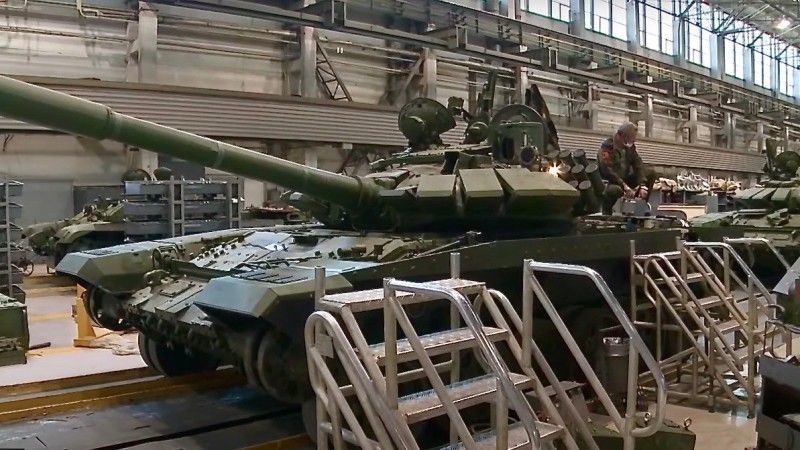Industry
Russian Defence Industry to Operate 24/7? [Commentary]

A minor stabilization has occurred in the Russian manufacturing output, mainly thanks to the increased levels of activity in the defence sector, Rosstat reports. The Russian defence industry may intensify its activity even further, as the Duma could move with an Act that could allow for an extension of work hours in industry, covering all 7 days per week, 3 shifts per day.
According to the data provided by Rosstat, the defence sector, as well as other domains where the orders are being awarded as a result of the ongoing war in Ukraine (despite no mention of that being made) enjoy high production rates. The above also refers to mixed sectors, where civil and military manufacturing outputs cannot be clearly separated, such as aerospace, radio, radars, or shipbuilding. Other domains that have a stabilizing impact on the industry include mining and nuclear energy component manufacturing industries.
War and Oil - Pulling The Economy
Officially, the recorded drop was 0.2% when compared to April, and 1.7% if a yearly change is accounted for (compared to pre-crisis circumstances of May 2019). The Center for Macroeconomic Analysis and Short-Term Forecasting (CAMAC), using a more realistic data set came up with a 1.3% monthly coefficient and 4.2% annual value. When it comes to goods with long lifecycles, such as consumer electronics or household items, or other hardware, a 52.1% drop has been recorded in April, and a 58.5% drop has been recorded in May 2019. This clearly shows that mining or food industries, that had to boost their production, enjoy prosperity - alongside the defence industry. The former two had to boost their manufacturing outputs, due to a lack of imports.

The aerospace and defence industry remains a silent hero, that is still keeping the Russian economy alive. The sector is rarely mentioned in official communications. This does not refer to brand new products, as it rather applies to overhauls, repairs, and delivery of spares for the equipment used in combat. Another sector that goes "full steam ahead", is the munitions manufacturing area. This does not apply to modern weapons, but artillery and firearms ammunition, used in mass quantities.
Embargo and Consumption - A Gordian Knot
The problem tied to modern weapons, or platforms such as the T-90M or T-72B3 MBTs, or Su-30SM and Su-34 combat aircraft, is caused by the limited stockpile of key components, most of which were imported. Russia does not always have a replacement in stock, and if it happens so, the manufacturing levels are limited. This applies primarily to microelectronics and optoelectronics. Not only do the ongoing repairs pose a challenge, but overhauls taking place as a result of intense use are also difficult.
Read more
One shall remember that the Russian equipment, especially aircraft, is operated based on pre-arranged lifecycles, not according to actual wear, as it usually happens in the west. The quality of numerous components also turns out to be low, which translates into a requirement for frequent overhauls. This is a factor that led to a situation in which modern weapons are used rarely, during the war in Ukraine that has been going on since 24th February. This is especially evident in the air force, where the Su-25 conduct most of the sorties, while the modern Su-34 bombers are a rarity - and the latter platform has been a frequent sight at the onset of the conflict. Most probably the flight hours reserves have been depleted, and the Fullbacks need to undergo overhauls. The problem above was not present in Syria, but the number of aircraft used was limited to a couple of examples per type. In Ukraine, the combat is far more intense, and it is dragging on. In some sense the Russian Air Force and Army experience shortness of breath, when it comes to the latest equipment, and thus they are reaching out for legacy reserve assets, that are less demanding maintenance-wise.
Another problem presents itself in huge munitions shortage, in the current "industrial" phase of the war, involving numerous tube and artillery assets, as if it was happening 7 decades ago. The US-based analysts have concluded that annual manufacturing output in the munitions department would be sufficient for no more than 2 weeks in a conflict of such intensity. It is difficult to assess the Russian stockpile and manufacturing, but it has been maxed out most certainly. A further boost in production is expected by the authorities implementing special legal means.

Photo. Технодинамика
Wartime Manufacturing Act, Without a War?
The Russian State Duma is currently working on a governmental bill "On Change of Some Legislative Acts of the Russian Federation, on the Matters Tied To Supplies for the Armed Forces of Russian Federation, other Elements, Military Formations, and Agencies, in the Counter-Terrorist and Other Operations, outside of the Russian Federation Territory". PM Mikhail Mishustin signed the act authored by the Deputy Head of the Governmental Department for the Defence-Industrial Complex, Danil Konokhik. The opening paragraph of the document reads as follows:
In the conditions in which Russian Federation Armed Forces, other elements, formation, and military organs conduct counter-terrorism and other operations outside of the Russian Territory, in particular, the Special Military Operations in the Donetsk People's Republic, Luhansk People's Republic, and Ukraine, increased demand for overhauls of armament and military equipment, and material/technical assets supply has been observed. The necessity to rapidly meet these demands, especially in the context of the introduction of means of limitation affecting the citizens of the Russian Federation by foreign states and international organizations (...) would require a temporary increased effort in some sectors of the economy, imposition of the load onto the manufacturing assets of the defence-industrial complex, including the mobilization assets, and organization of resources support for deliveries, within the defence organization of the state.
Fragment of the Act
Read more
This sound serious and unclear. But it boils down to the imposition of manufacturing maximization on the industry, and its subcontractors, with that manufacturing being dedicated to the Ministry of Defence, Rosgvardia, Federal Security Service, and the Ministry of Emergency Situations. What means could be used for that purpose? Making it legal to force industrial employees to work at night, and during holidays. 7 days per week, 3 shifts, if that is deemed necessary.
All of the above is encompassed by the term of "special means within the scope of the economy". Since this set of means contradicts the Russian Labor Code, it is to be customized to match the demands of industrial mobilization. As the new regulations contradict the Labor Code, changes to that Code have been proposed by the government.

The changes in contract performance are also quite interesting. If an enterprise is asked by the relevant authorities, it would have no right to reject the requests, regardless of its organizational or legal form, meaning that the regulations would also apply to manufacturers and suppliers outside of the state sector. Furthermore, as the contract is performed, the contracting party may adjust the contract provisions, for instance by increasing the quantitative format of the order or changing the value of the said order. Briefly speaking, the authorities would be allowed to force the state- and privately-owned facilities to adopt a 3-shift system, working 7 days a week, freely modifying the value and quantitative of the contracts, within the scope of "special means within the scope of the economy".
Not only is the above applicable to the aerospace and defence sector, but also the subcontractors, and other businesses rendering services and delivering goods to Rosgvardia, the Armed Forces, or the FSB. The regulations alone are subject to loose interpretation - they would thus also include facilities dealing with overhauls of MBTs, those manufacturing munitions, or even those supplying the military units with canned food or bread. The regulations may also be applicable in the case of enterprises that, so far, stood quite far away from arms manufacturing.
That method could be used by the Kremlin, not admitting that war in Ukraine is aimed at exhaustion, to get a right to switch the industry into a wartime mode. Without that, maintaining a similar operational tempo would be a major challenge. This applies, in particular, to the delivery of munitions, but also overhauls of vehicles and artillery units. The barrels are exposed to wear that is in sync with the quantity of ammunition sent down range. A separate issue that needs to be resolved is tied to the replacement of components sourced abroad, and used in the latest, modern equipment types. This cannot be resolved by a "Tsar's decree". Even if that decree would be applicable in case of the privately owned businesses. One cannot rule out a scenario in which, at least partially, the Kremlin would be making attempts at using the new legislation to get private entities involved in defence contracting - this referring to businesses that so far have not been delivering components for the defence industry, and yet were active in other branches of the high tech industry.
